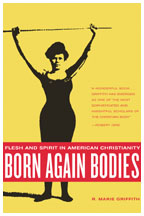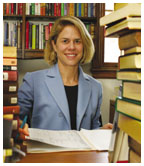Religion professor R. Marie Griffith has explored what some Christians believe our bodies can tell us about our souls. (Denise Applewhite) |
Fat
equals sin
Marie Griffith explores Christian diet culture
Associate professor of religion R. Marie Griffith joined a Christian diet program, Weigh Down, a few years ago. A slender woman who is Protestant, Griffith participated not to lose weight but to conduct research for her new book, Born Again Bodies: Flesh and Spirit in American Christianity, in which she investigates contemporary Christian diet culture and its religious roots.
In the program, Griffith, whose book was published by the University of California Press in October, found a gospel of slenderness and beauty. During Weigh Down workshops, participants listened to videos of the program’s thin, blond founder and CEO, Gwen Shamblin, preach about the virtue of saying “no” to unhealthy foods. Shamblin, like other evangelical diet leaders, says Griffith, tells her followers that the thinner and more disciplined they are, the more God will find favor with them. Fat is equated with sin, Griffith says, and comes in between the individual and God’s love. “Disregard what goes into your body, many [of these leaders] suggest,” writes Griffith, “and you will not only gain weight, look ugly, and feel awful but you will also doom yourself to a lifetime and likely an eternity of divine disfavor.”
Although some Catholics and non-Christians have joined religious diet programs, these programs primarily attract white, middle-class evangelical Protestants, says Griffith. She estimates there are between 10 and 20 different Christian diet programs. According to statistics gathered by the programs, hundreds of thousands of people are enrolled.
 Griffith
became interested in the body-soul relationship in evangelical Christianity
while researching her book, God’s Daughters: Evangelical Women
and the Power of Submission (1997). Many of the evangelical women
she interviewed were obsessed with their weight and read Christian diet
books. Griffith found that the number of these books, such as What
Would Jesus Eat? (2002), grew enormously in the last 30 years, when
about 150 books have been published.
Griffith
became interested in the body-soul relationship in evangelical Christianity
while researching her book, God’s Daughters: Evangelical Women
and the Power of Submission (1997). Many of the evangelical women
she interviewed were obsessed with their weight and read Christian diet
books. Griffith found that the number of these books, such as What
Would Jesus Eat? (2002), grew enormously in the last 30 years, when
about 150 books have been published.
In tracing the diet culture’s roots in America, Griffith focuses on the post-Civil War period through the 20th century. In the New Thought spiritual movement of the late-19th century, “slenderness and beauty became concrete signs of personal power and the maturity of the soul,” she says. By the 1950s, fat had been explicitly linked with sin in Charlie Shedd’s Pray Your Weight Away (1957), the first religious book in the diet culture.
At the Weigh Down group Griffith joined, she found that the participants see Shamblin, a nutritionist and fundamentalist from Tennessee, as a prophet. “Shamblin clearly believes God has called her to this work,” says Griffith.
Griffith sees problems in Christian diet culture. “Christian diet
authors have not acknowledged the socioeconomic reasons for obesity,”
writes Griffith. These leaders, she argues, don’t take into account
that many people may not be able to afford to buy fresh produce or to
exercise regularly. Griffith also sees contradictions in their messages.
“They want their faith to be about loving and accepting everyone,”
says Griffith. But suggesting that being overweight disappoints God and
imperils your salvation, she says, “makes God’s love seem
conditional.” ![]()
By K.F.G.
BOOK SHORTS
 The Corporate Transformation of Health Care — John
P. Geyman ’52 (Springer Publishing). The author argues that the
corporate transformation of hospitals, health-maintenance organizations,
and the insurance and pharmaceutical industries has resulted in reduction
of health-care services, poor regulation, and corrupt research. Geyman
makes the case for a system of publicly financed, national health insurance.
Geyman is a family physician.
The Corporate Transformation of Health Care — John
P. Geyman ’52 (Springer Publishing). The author argues that the
corporate transformation of hospitals, health-maintenance organizations,
and the insurance and pharmaceutical industries has resulted in reduction
of health-care services, poor regulation, and corrupt research. Geyman
makes the case for a system of publicly financed, national health insurance.
Geyman is a family physician.
 Taking Sex Differences Seriously — Steven E. Rhoads
’61 (Encounter Books). The author argues that men and women are
different — women are more nurturing and better at intimate relationships,
for example, and men are more promiscuous, aggressive, and competitive
— and that these natural differences are hardwired into our biology
rather than determined by society. Rhoads is a professor of public policy
at the University of Virginia.
Taking Sex Differences Seriously — Steven E. Rhoads
’61 (Encounter Books). The author argues that men and women are
different — women are more nurturing and better at intimate relationships,
for example, and men are more promiscuous, aggressive, and competitive
— and that these natural differences are hardwired into our biology
rather than determined by society. Rhoads is a professor of public policy
at the University of Virginia.
 The Home Run Horse: Inside America’s Billion-Dollar Racehorse Industry
and the High-Stakes Dreams That Fuel It — Glenye Cain
’90 (Daily Racing Form Press). In this study of the Thoroughbred
horseracing industry, the author goes behind the scenes in the quest to
breed, buy, and develop champion racehorses. She looks at the pressure
on trainers to produce the next Smarty Jones. Cain is a correspondent
for Daily Racing Form.
The Home Run Horse: Inside America’s Billion-Dollar Racehorse Industry
and the High-Stakes Dreams That Fuel It — Glenye Cain
’90 (Daily Racing Form Press). In this study of the Thoroughbred
horseracing industry, the author goes behind the scenes in the quest to
breed, buy, and develop champion racehorses. She looks at the pressure
on trainers to produce the next Smarty Jones. Cain is a correspondent
for Daily Racing Form.
By K.F.G.
For a complete list of books received, click here.

